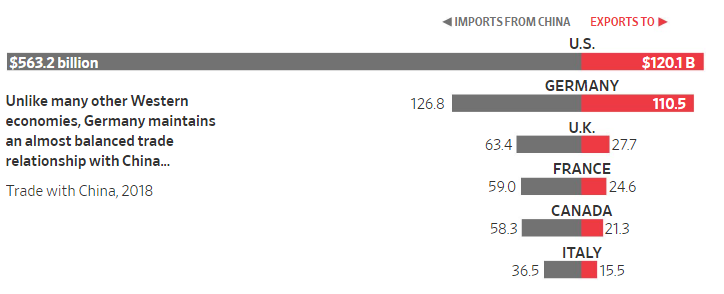The recent article “China, once Germany’s partner in growth, turns into a rival” in Wall Street Journal does nothing more and nothing less than repeat what we have already known for years: China is gaining competitiveness in the world scene while Europe (and the US) is losing it. The difference with the past is that this competitiveness is not referring to commodities understood as “mass-produced unspecialised products” (Merriam-Webster, 1c) but to very high technological goods which used to be the pride of Western corporations and proof of their superiority.
The second truth stated in the article is also known by all: European companies do not compete on equal terms with Chinese firms form diverse points of view. While in Europe rely on private financing (mainly bank loans) to push their investment plans, in China, the Government injects vast amounts of resources to support their industry and makes it more competitive.
The third truth is not a surprise either: it is much easier for Chinese producers to enter the European market than vice-versa. The bureaucratic load that Western companies face when they try to enter the Asian giant is not only much heavier, also much more expensive and discouraging.
And a final hint is pointed: human rights’ considerations are not equal, but we could add that neither environmental protection rules, workers’ rights and benefits, and the bunch of regulations that limit the European operative have paragon in China.
So it is not a surprise that, as said in the article, “It’s only a matter of time until Chinese firms are number one”.
For sure we do not want their autocratic rules and lack the respect of basic rights, but to gain industrial competitiveness, China is doing things well, and we are doing them wrong. We impose to our companies excessive rules handcuffing their development or clearly stopping it, as in the attempt by Siemens to merge with Alstom and create the world leader because “The merger would have harmed competition in markets for railway signalling systems and very high-speed trains”. Someone should understand that the European Union is not the whole of the world. Justifying the decision stating that “Millions of passengers across Europe rely every day on modern and safe trains. Siemens and Alstom are both champions in the rail industry. Without sufficient remedies, this merger would have resulted in higher prices for the signalling systems that keep passengers safe and for the next generations of very high-speed trains. The Commission prohibited the merger because the companies were not willing to address our serious competition concerns.” Thanks to the short-sight of the European Commission, now not only a European giant cannot compete worldwide in better conditions, but Chinese companies can compete in Europe and take their part of the cake with much more advantageous conditions. Does anyone in Brussels need an Earth globe? With a simple glance, they could see how small we are compared to the rest of the world.
Our trade balance with China is all except a balance.

But we can only have a balance when the totality of factors of production are balanced and comparable. I very much enjoy the positive side of globalisation, but the same production rules for all countries should be a cornerstone of international trade. In their absence, their unfair effects should be corrected by protective measures that could compensate for the damage. Otherwise, we are self-destroying more than we have already done.
(A final thought: the alarm seems to go off quite loud now that our more prominent industries and sectors of major interest (pharma for instance) seem to lose ground and we depend on foreign producers. This is a late reaction. During thirty years, we have dismantled most of our industrial sectors to manufacture cheaply in Asia regardless of production conditions and environmental issues. Not imposing the same rules, we helped to develope other countries, which is good, but in total we did not create a better society everywhere, but for sure we created a poorer Europe.)





